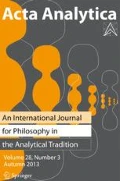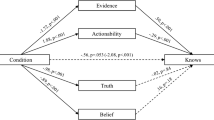Abstract
The semantic blindness objection to contextualism challenges the view that there is no incompatibility between (i) denials of external-world knowledge in contexts where radical-deception scenarios are salient, and (ii) affirmations of external-world knowledge in contexts where such scenarios are not salient. Contextualism allegedly attributes a gross and implausible form of semantic incompetence in the use of the concept of knowledge to people who are otherwise quite competent in its use; this blindness supposedly consists in wrongly judging that there is genuine conflict between claims of type (i) and type (ii). We distinguish two broad versions of contextualism: relativistic-content contextualism and categorical-content contextualism. We argue that although the semantic blindness objection evidently is applicable to the former, it does not apply to the latter. We describe a subtle form of conflict between claims of types (i) and (ii), which we call différance-based affirmatory conflict. We argue that people confronted with radical-deception scenarios are prone to experience a form of semantic myopia (as we call it): a failure to distinguish between différance-based affirmatory conflict and outright inconsistency. Attributing such semantic myopia to people who are otherwise competent with the concept of knowledge explains the bafflement about knowledge-claims that so often arises when radical-deception scenarios are made salient. Such myopia is not some crude form of semantic blindness at all; rather, it is an understandable mistake grounded in semantic competence itself: what we call a competence-based performance error.
Similar content being viewed by others
Notes
Essentially this same point is stressed by DeRose (2006).
Although knowledge-contextualists sometimes write as though they believe that the contextual salience of a radical-deception scenario automatically drives the implicit parameters governing the fine-grained semantics of ‘know’ to a maximally demanding setting, we ourselves would deny that this is so. One can stand one’s ground in such a context if one chooses to do so, and one can persist in using ‘know’ under more typical parameter-settings. Thus, one can correctly say (for example), “I know I have hands, even though my evidence for this claim would be exactly the same even if I were an envatted brain.”
References
Bach, K. (2005). The Emperor’s New ‘Knows’. In G. Preyer and G. Peter (Eds.), Contextualism in philosophy: Knowledge, meaning, and truth (pp. 1–44). Oxford University Press.
Cohen, S. (1999). Contextualism, skepticism, and the structure of reasons. Philosophical Perspectives, 13, 57–89.
Conee, E. (2005). Contextualism contested. In M. Steup and E. Sosa (Eds.), Contemporary debates in epistemology (pp. 44–56). Blackwell.
DeRose, K. (1995). Solving the skeptical problem. Philosophical Review, 104, 1–52.
DeRose, K. (1999). Contextualism: An explanation and defense. In J. Greco and E. Sosa (Eds.), The blackwell guide to epistemology (pp. 187–205). Blackwell.
DeRose, K. (2006). “Bamboozled by our own words”: Semantic blindness and some arguments against contextualism. Philosophy and Phenomenological Research, 73, 316–338.
Feldman, R. (1999). Contextualism and skepticism. Philosophical Perspectives, 13, 91–114.
Hawthorne, J. (2004). Knowledge and lotteries. Oxford University Press.
Horgan, T., & Potrč, M. (2008). Austere realism: Contextual semantics meets minimal ontology. MIT Press.
Horgan, T., & Timmons, M. (2002). Conceptual relativity and metaphysical realism. Philosophical Issues, 12, 74–96.
Lewis, D. (1977/1983). Scorekeeping in a language game. In his Philosophical Papers, volume I (pp. 233–249). Oxford University Press.
Lewis, D. (1996). Elusive knowledge. Australasian Journal of Philosophy, 74, 549–567.
Schiffer, S. (1996). Contextualist solutions to scepticism. Proceedings of the Aristotelian Society, 96, 317–333.
Stanley, J. (2005). Knowledge and practical interests. Oxford University Press.
Unger, P. (1975). Ignorance. Oxford University Press.
Author information
Authors and Affiliations
Corresponding author
Rights and permissions
About this article
Cite this article
Horgan, T., Potrč, M. Epistemological Skepticism, Semantic Blindness, and Competence-Based Performance Errors. Acta Anal 28, 161–177 (2013). https://doi.org/10.1007/s12136-012-0164-2
Received:
Accepted:
Published:
Issue Date:
DOI: https://doi.org/10.1007/s12136-012-0164-2




